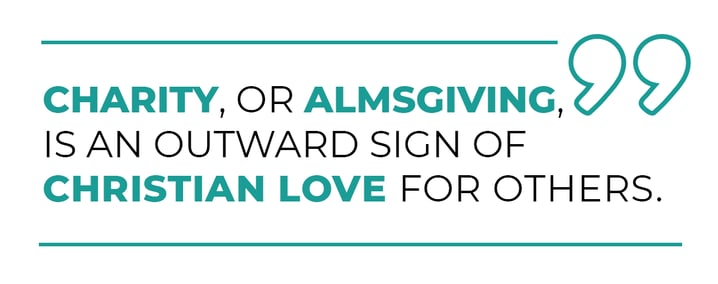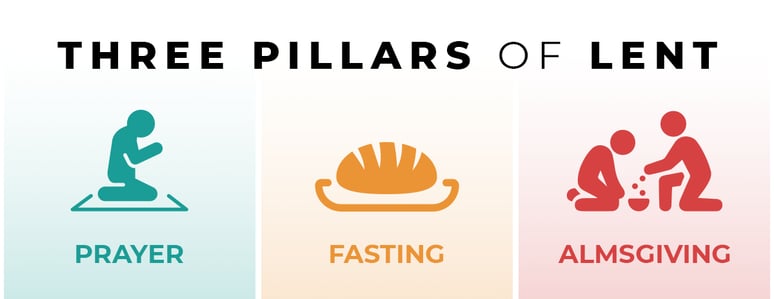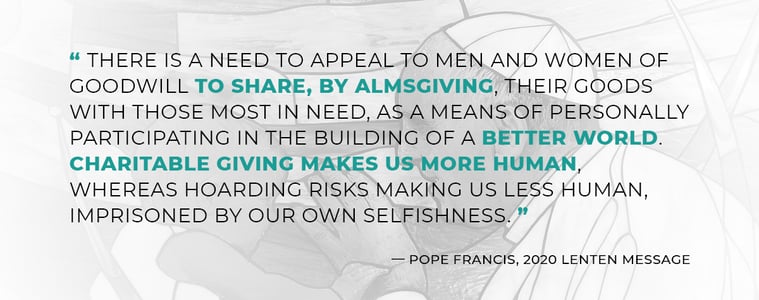If the word “almsgiving” conjures up images of Lent, fishfries, parish soup suppers and giving to the rice bowl—then you are in good company.
But many Catholics are surprised to learn that the practice of giving alms isn't just a Lenten spiritual discipline. It is meant to be a year-round exercise, an integral part of our spiritual lives, and can be a tool that leads us to a deeper union with Jesus Christ and the universal church.
Together, let’s dive into the spiritual discipline of almsgiving and learn how we can incorporate it into our lives.
The Catholic Church considers almsgiving "a witness to fraternal charity" and "a work of justice pleasing to God" (Catechism of the Catholic Church, No. 2462).
Almsgiving is the act of donating money or goods to the poor or performing other acts of charity. However, when defining almsgiving, it helps to understand the meaning behind the word itself.
The roots of the word “alms” can be found in ancient Latin and Greek words meaning mercy and pity. Similarly, the root of the word “charity” comes from the Latin “caritas,” meaning love.

Charity, or almsgiving, is an outward sign of Christian love for others. Generally, it involves some type of sacrifice on behalf of the giver in order to provide for the needs of the other. In doing this, bonds of community are formed.
While almsgiving is most closely associated with Lent, the practice of giving alms can, and should, be a year-round spiritual exercise for all Catholics and Christians. Giving alms is essential to fostering a deep spiritual life because it allows us to step outside of ourselves and focus on the needs of others.
More than simply giving money, almsgiving is an act of love that can deepen our prayer life and bring a greater sense of meaning to fasting.
Almsgiving incorporates the spiritual practices of prayer and fasting in a way that manifests itself by caring for our neighbors in need. It can deepen our prayer as we are brought into contact with our brothers and sisters who live in poverty and give us a greater understanding of what it means to go without while fasting.
It can also prompt important questions: Do I really need this? Am I consuming too much? Almsgiving provides us with a human connection and the opportunity to see the impact that works of charity can have on others
Together let us pray for the needs of the global church. Submit your information and we will email you the novena!
Almsgiving is an ancient practice that brings us into communion with one another in ways that extend beyond fasting and prayer. By caring for the needs of those around us, we are participating in the merciful work of the Church to provide for all members of our universal family.
Let's explore the ancient practice of almsgiving by examining answers to the following questions (click the links below to jump straight to the section):
Charitable giving is an ancient practice that is customary in many cultures and religions. As Christians, we are called to follow in the example of Christ who showed great compassion to those on the fringes of society. Even if we do not see them, the poor have always been among us and so has the call to support them.
The Catechism states that charity is “the theological virtue by which we love God above all things for his own sake, and our neighbor as ourselves for the love of God” (CCC, No. 1822).
More than simply giving money, almsgiving is an act of love that incorporates both prayer and fasting and manifests itself by caring for our neighbor in need. As we help our brothers and sisters who live in poverty, we become more connected to God and to one another.
At its core, almsgiving is a spiritual and religious practice that strengthens our love for others, increases our detachment and contributes to greater social justice.
This threefold meaning of almsgiving helps us understand why it is particularly central to the season of Lent. During Lent, Jesus invites us into a deeper journey with him, and to journey with Jesus Christ means to live as Christ lived.
Throughout his ministry, we see Jesus caring in a special way for sinners, tax collectors, the impoverished, the sick and anyone else on the margins of society. With the rich young man and with the scribes and Pharisees who persecute him, we see Jesus chastising them and calling them to a higher order of love, mercy and material detachment so that they too can serve the poor as they ought.
When we give alms, we are making a concrete donation of ourselves (through money, time, talent or service) to others. The concreteness of almsgiving is crucial. Although prayer for others is worthy and good, almsgiving helps us say, in crystal clear terms: “Here is what I can offer, and I offer it out of love for you (and God) because I care about your welfare.”
The Church teaches us that all people are made in the image of God and so possess equal and inherent dignity. Each person has a right to all they need to live their full potential as intended by God.
At the root of the practice of almsgiving is the principle that "everyone should look upon his neighbor (without any exception) as 'another self,' above all bearing in mind his life and the means necessary for living it with dignity" (CCC, No. 1931). This responsibility to care for our neighbors becomes even more important when it involves those who are disadvantaged (CCC, No. 1932).
By treating our neighbor as “another self” we are removing any human barriers that might separate us. God sees all men and women as his children, equal in his eyes, and therefore deserving of fair and just treatment. Almsgiving allows justice to flourish through simple acts of love and compassion.
We'd love to send you information about our work to ensure safe and healthy futures for the vulnerable around the globe. Fill out the form and we will be in touch!
In the Old Testament, the notion of alms is understood primarily through the context of justice, and charity was an integral part of Jewish custom long before the time of Christ. In fact, the Hebrew word for almsgiving, "tzedakah," means righteousness. It is believed that giving to the poor helps reestablish the right order and encourages justice.
Hebrew law ensured that the gleanings from the harvest should be left for the poor in the field and vineyard (Leviticus 19:9-10). In Proverbs, we are told that “whoever is kind to the needy honors God” (14:31); however, refusing to give alms to the poor brings just retribution (21:13).
Tobit tells us that "it is better to give alms than to store up gold, for almsgiving saves from death and purges all sin. Those who give alms will enjoy a full life" (Tobit 12:9).
Throughout the Old Testament, scripture has a lot to say about the righteousness of almsgiving, including the following:
In the New Testament, almsgiving is primarily viewed as an act of love and compassion. A critical component of Christ’s teachings is to love one another as God loves. By caring for others and sharing our fortune with them, we are participating in the work of Christ on earth.
Christ directs us to care for others as we would care for him. He tells his disciples, “Amen, I say to you, whatever you did for one of these least brothers of mine, you did for me” (Matthew 25:40).
The parable of the Rich Man and Lazarus also shows us the importance of almsgiving and caring for the poor in the eyes of God. The rich man ignored the beggar Lazarus while on earth and was cast into hell at the time of his death (Luke 16:19–31).
We do not, however, have to be wealthy and give great amounts. In Luke’s Gospel, the poor widow who gave only two coins to the offering (21:1-4) is a wonderful example of the power of almsgiving, even when we feel we have nothing to give.
The importance of almsgiving is seen repeatedly throughout the New Testament. Some additional examples include:
The scriptures show us that simple acts of kindness and selflessness are all that is required to make a meaningful difference in our lives and the lives of those around us.
The Vineyard is our community of monthly supporters, who make our work possible. Learn more about this group—submit your email and we will send you more information!
For 40 days each year, the universal church comes together to share in the penitential acts of the Lenten season. During this time we are called to a true conversion of heart as followers of Christ. The Church offers us three means of working towards this interior conversion: prayer, fasting and almsgiving.

These three pillars of Lent draw us closer to God and one another by helping us to overcome our own selfish desires. Many of us are quick to make faithful resolutions regarding fasting and prayer. But almsgiving, the most outwardly focused pillar, tends to be the most overlooked.
While giving alms to the poor is an important corporal work of mercy, the term “almsgiving” is one we hear most frequently during Lent.
The three pillars of Lent—prayer, fasting and almsgiving—are expressions of the fundamental purpose of Lent, which is to turn to God in a conversion of heart. Each pillar is distinct yet remains vitally connected to the others, forming a unique triad that draws us closer to God and one another throughout this penitential season.
Acts of almsgiving during Lent allow us to:
Two of the central lessons of the cross are compassion and selflessness. As we enter the Lenten season, the world continues to suffer from pain and unrest. Now, more than ever, acts of almsgiving can bring us together and heal our wounds.
In his 2020 Lenten Message, Pope Francis stated that “there is a need to appeal to men and women of goodwill to share, by almsgiving, their goods with those most in need, as a means of personally participating in the building of a better world. Charitable giving makes us more human, whereas hoarding risks making us less human, imprisoned by our own selfishness.”

This year, there is an unprecedented number of people in need, as the world continues to recover from the devastating effects of the pandemic.
Many dioceses hold special appeals for local needs during Lent, and there are countless other ways to offer your time, talent and treasure.
Look for ways to incorporate some of the following almsgiving examples into your Lenten practice:
When our next Lent Prayer Resource comes out—you'll be the first to know! Submit your name and email and we will add you to our list 👉🏼
Now that we’ve talked about the importance of almsgiving, it’s time to get creative with our personal call to give alms. There are so many ways to make this a joyful and fruitful spiritual practice!
These almsgiving examples are meant to be a springboard for your own thoughts and ideas so you can shape them to the context of your own life. Like them all? Try one for a month at a time until you find a practice that resonates with you. Then, resolve to continue giving alms throughout the rest of the year!
Click the links below to show examples of almsgiving that match your interests or circumstances:
Sometimes we get so used to giving alms in the form of regular tithes to our parish or to a favorite charity that we forget the more immediate ways we can give to the people around us, whether family, friends or those in the larger community.
Learning the spiritual discipline of detachment is one of the most important and difficult spiritual practices. Whether we are too attached to material things or to our own pride and sense of control, almsgiving can help us.
Here are some simple almsgiving ideas to help us detach from both our sense of control and our physical, material goods.
This past year has been tough on many people’s wallets. If you are contemplating almsgiving with a sinking feeling in your heart, you are not alone. Jesus Christ sees your struggles and your needs and he will treasure the generosity of whatever you can offer, even if it seems small.
Here are some ways you can give alms even if you can’t spare much money.
Do you have a particular passion or interest, either in the realm of work or a hobby? Perhaps you have always wanted to learn more about a specific topic or current event, but never found the time to? Try almsgiving but with a specific theme in mind!
This will allow you to combine generosity with the opportunity to learn more about something that engages your imagination and interests.
Prayer and almsgiving are the peanut butter and jelly of the spiritual life: They work best together.
If you are interested in strengthening your prayer life, try to combine habits of prayer with little gifts of alms.
Almsgiving allows us to let go of our own desires and focus on the needs of those who are less fortunate. Two of the central lessons of the cross are compassion and selflessness. By giving alms, we are sacrificing our temporal comfort for the good of another person. When we give alms our aim is to be more dependent on God to meet our needs (rather than providing for ourselves) while also tending to the needs of others.
The call to give alms is present throughout scripture. A critical component of Christ’s teachings is to love one another as God loves us. By caring for others and sharing your fortune with them, you are participating in the work of Christ on earth.
Christ directs us to care for others as if they were Jesus himself. He tells his disciples, “Amen, I say to you, whatever you did for one of these least brothers of mine, you did for me” (Matthew 25:40)
The widow with the two coins from Luke’s Gospel is a wonderful example of the power of almsgiving, even when we feel we have nothing to give:
"When he looked up he saw some wealthy people putting their offerings into the treasury and he noticed a poor widow putting in two small coins. He said, ‘I tell you truly, this poor widow put in more than all the rest; for those others have all made offerings from their surplus wealth, but she, from her poverty, has offered her whole livelihood’"(Luke 21:1-4).
As Catholics, giving to those who are less fortunate and supporting charitable organizations is a spiritual discipline that we can engage in to strengthen our relationship with the Lord and with the Body of Christ.
In fact, it is because of those who’ve answered the call to give alms that organizations such as Divine Word Missionaries are able to support those who need it most. We continue to be amazed and inspired by the compassion and generosity of those who practice almsgiving and support our cause.
Without the generosity of our supporters and those who give alms to help sustain our work, Divine Word Missionaries and other charitable organizations like us wouldn’t be able to carry out our mission and make an impact around the globe.
The call to give alms is an invitation to share in the mission of the cross and make the needs of others, our own. When you support our missionaries through charitable giving, you deepen your spiritual life and participate in the critical work of the universal church.
Divine Word Missionaries work tirelessly to feed the hungry, care for the sick, foster education, shelter the homeless and bring Jesus, the Divine Word, to vulnerable populations around the world.
By making a financial gift, your almsgiving will ensure that our missionaries can continue to make Jesus known to every person, in every nation. You can also support our work by praying for the success of our missionaries and mission projects. Please know we are very grateful for all the ways you support our mission work and make it possible.